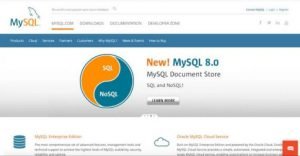Top 10 Best Database Software Updated in 2021

Do you want to know what the finest database software will be in 2021? Whether small businesses or large multinationals, the digital revolution has enabled them to generate data at every point of touch with their customers. Whether it’s client data or marketing automation, businesses must keep data structured while still preserving security.
Customer relationship management (CRM) and database software are used by 90% of companies with more than 11 employees to simplify data for a variety of useful applications. In 2019, sales for the $15 billion mobile CRM and database market increased by 11%. However, before deploying database software, you must first identify which database software will work best for your firm. To make your decision a bit easier, I’ve collected and reviewed a list of the finest database software to use this year.
What is the Best Database Software?
This year’s best database software, in my opinion, includes the following tools:
1. MySQL

MySQL is a free database management system that manages relational databases. MySQL is included in the majority of web hosting companies’ basic packages. As a result, it is used by both novice and professional web designers.
Pros:
- It has a stronger data recovery capacity.
- Those without a programming experience can rapidly pick up on the basics.
- Because it is an open-source application, it allows for complete data customization.
- Because of its cheap cost structure, it is a more viable solution for small firms and entrepreneurs.
- The data development approach is adaptable for both small and large applications.
- Integration with the Apache web server is simple.
Cons:
- When you restart or refresh the Database Software , queries do not respond.
- Having an excessive reliance on third-party plugins
- The Linux operating system makes data management more difficult.
Pricing:
MySQL Standard, Enterprise, and Cluster Carrier Grade editions are priced at $2000, $5000, and $10,000, respectively.
2. Improvado

Improvado is a well-known database software solution that can assist small and large businesses collect all of their marketing data in real-time. It’s a marketing middleware system that’s both flexible and scalable.
Pros:
- You can quickly migrate your data and duplicate the online database.
- Metrics are compared side by side for faster business decisions.
- Data models are integrated in real time while a live connection is maintained on a dedicated database server.
- Customer service that is second to none, thanks to the engineering team’s extensive training and experience.
- Navigation control and a clean user interface
- Access to regular status and updates on numerous projects at all times.
- Data analysis that is both error-free and enlightening
- Users can employ backup software and data recovery options.
- Database documentation that has been well-planned and is free of errors.
Cons:
- During the analytical comparison
- The database frequently ignores the most recent entries.
Pricing:
- Improvado’s Business package, which costs $100 per month, includes all of the features your company requires.
- Small enterprises on a tight budget can benefit from the Enterprise edition’s tailored price.
- You may also arrange the Database Software demo version to try out its capabilities.
3. Microsoft SQL Server

One of the most popular and frequently used database software systems is Microsoft SQL Server.This relational database management system server is perfect for simultaneously storing and retrieving many requests.
Pros:
- It’s easier to set up a new database server from the ground up.
- Ability to construct several tables, designs, and data without having to use syntax
- Make use of the Developer Network
- A feature that allows you to create sophisticated queries
- Complex queries are handled, and other applications are integrated.
- Using Template Explorer, locates a number of names in the database system.
- Scripts and views of related objects or groups are combined.
- Distributed database management and advanced queries
- Software that is more advanced than Microsoft Access
Cons:
- The time it takes to execute a large query is frequently longer than the calculated time.
- A selected schema makes data maintenance difficult.
Pricing:
- The “Express” and “Developer” versions are both free to download.
- Paid plans start at $931 and go up to $14,256 per year (one-time cost).
4. Knack

Knack is the most user-friendly online Database Software I’ve seen, having been established in 2010. They’re a cloud-based web application that allows users to organise, link, and extend data without knowing how to code. Knack’s clients include Intel, Capital One, HP, Spotify, Panasonic, Zendesk, Honda, Harvard University, and many others.
To begin using Knack, make a list of the primary columns you’ll need, such as name, email, address, phone number, and any number of custom categories. After that, you connect your data to multiple platforms by integrating it. They offer a powerful API that connects to a variety of popular apps, such as Zapier, to extend their capabilities:
Finally, you use custom formulas and equations to broaden and improve the value of your data. And it’s all done through a user-friendly online interface that doesn’t require any coding knowledge. Knack additionally has 39 database templates pre-built based on the sort of organisation or functionality.
For example, if you’re an agency, you can utilise a custom CRM template to manage customers and assign tasks and meetings in order to generate sales. There are database templates for anything from project management to tracking purchase orders, inventories, payroll, and, if you’re a large organisation, even posting job adverts on your website.
You can save a lot of money among interdepartmental teams that might be using 4-5 different tools to accomplish the same thing with this much functionality in one piece of software.
Pricing:
- Knack offers three different pricing plans, ranging from $39 to $179 per month.
- Their $39/month Starter Plan includes up to 20,000 records, 2 GB of storage, and three app connections.
- At $79 per month, the Pro Plan gives you 50,000 records, 5 GB of storage, and 8 app connections.
Finally, their famous Corporate Plan includes 125,000 records, 50 GB of storage, 25 app connections, and premier, white-glove service.
- Plus 1, Plus 2, and Plus 3 are special enterprise plans that greatly expand the database.
- For $999 per month, you can get 1.5 million records with the Plus 3 plan.
5. Altibase

Altibase is an open-source, enterprise-grade, and Database Software high-performance relational database. It expands horizontally and vertically utilising auto-extend in-memory sharding and tables. Samsung, Hyundai, and HP are among its most noteworthy clients.
Pros:
- It allows for more accessibility in a variety of industries, including telecommunications, finance, manufacturing, and government service.
- In-memory databases, as well as disk-resident databases, are supported by the unified engine.
- It comes with all of the necessary tools and relational capabilities to support enterprise applications.
- It supports ANSI SQL-92 as well as other SQLs given by other systems. It also supports all languages that use JDBC and ODBC, as well as other programming languages such as C, C+, Java, and others.
- Remote Altibase DBAs handle abrupt failures and provide substantial customer assistance via training requests.
- It also provides preventive health examinations to ensure optimal availability and dependability.
- It is easier to migrate from a legacy database.
Cons:
- If you configure it, data activities may slow down.
- There is no support for mobile access.
- Lack of a graphical user interface (GUI) management tool
- Windows Server and client are not supported.
Pricing:
It’s a free, open-source database management system that doesn’t require any subscriptions or processing costs.
6. Amazon Relational Database Service (RDS)

Amazon RDS is a relational Database-as-a-Service (DBaaS) that competes with Amazon Web Services’ other competent offerings (AWS). Experienced data scientists, users, and digital-first enterprises will love it.
Pros:
- It handles large workloads in a single database system.
- You only have to pay for the resources you consume at any given time.
- Access databases such as Oracle, MySQL, and Microsoft SQL with ease.
- It’s a popular choice among programmers because of its flexibility and expandable storage via simple API requests.
- It provides a solid and reliable performance.
- Users have a lot of options and controls.
- Customer service that is responsive and capable of
- Through its EMR service, it takes advantage of big data tools in a seamless manner.
Cons:
- Auto-scale capabilities are restricted.
- Users are unable to check server logs due to the lack of actual servers.
- It is more expensive than other DBMS choices on the market.
Pricing:
- Amazon RDS is a free-to-try service.
- Users can only pay for the resources they utilize.
- To pay for its services, you can use On-Demand or Reserved Instance.
Although paying for resources utilized may appear daunting, you can quickly estimate your monthly bill with the AWS Simple Monthly Calculator.
7. SQL Developer

SQL Developer Database Software provides secure connection features for a variety of database technologies. It has a lot of flexibility and a lot of tools that can be used for almost anything. It also helps with Oracle database maintenance and development, whether in the cloud or on-premises.
Pros:
- Users can streamline data management.
- It gives you access to a variety of database technologies.
- For its essential functions, its user interface is simple.
- Provides outstanding customer service in the event of a problem or glitch.
- The software does not need to be installed.
- Simply copy the folder to your operating system.
Cons:
- Database queries are frequently changed by automated operating systems.
- Storage and resource management, for example, are not straightforward.
- With Enterprise Manager, there is no integration with SQL Developer.
Pricing:
- SQL Developer is a completely free program.
8. IBM Informix

IBM Informix reliably manages and secures business-critical data. Database software provides boundless scalability and a diverse set of tools for leveraging data’s potential. It’s noted for delivering industry-leading OLTP (Online Transactional Processing) performance at a reasonable cost.
Pros:
- The basic engine and Warehouse Accelerator module provide cutting-edge data warehouse performance.
- In comparison to other RDBMS systems, it may be embedded more efficiently.
- From the Raspberry Pi to the state-of-the-art multi-layered distributed nodes computing system, it provides great scalability and compatibility.
- Ability to combine relational data with geographical data, JSON data, and other unusual data formats in a time series
- Perfect for businesses looking to take advantage of parallel and multi-threaded data processing Intuitive dashboard for monitoring server performance
- User authentication mechanisms can be configured using Pluggable Authentication Modules.
- The ability to compress data speeds up I/O, replication, and backup procedures.
Cons:
- The replication feature needs to be improved.
- It’s difficult to find people who have worked with Informix before.
Pricing:
- Small, Medium, Large, and Extra Large are the four options offered by IBM Informix.
- The plans range in price from $1250 to $2200 to $4000 to $8000.
9. EMS SQL Manager

You can combine data analytics components into a single dashboard using EMS SQL Manager. It also has a robust vendor support team that can assist you with all of your online database requirements.
Pros:
- It helps users who only want to keep an eye on an existing database system.
- Multiple SQL tools are already linked with EMS.
- Multiple SQL queries on the database can be executed more quickly.
- Provides HTTP access to the PostgreSQL server.
- It comes with a user-friendly and powerful visual database designer.
- Data manipulation is more efficient and security management is more significant.
- Capabilities to export and import large amounts of data
Cons:
- When dealing with several Database Software objects at the same time, it becomes slower.
- Providing multi-user access to a system might be complex at times.
Pricing:
- EMS SQL Manager is now available for free download.
10. Oracle RDBMS

Oracle RDBMS is one of the most widely used object-relational database management systems, and the latest version contains a number of useful enhancements. Enterprises can use enterprise-scale database technology that can be kept on-premises or in the cloud.
Pros:
- Users can construct partitions to gain more administrative control over their data. Cons: Data security and transactional process are not guaranteed.
- Complex query optimization that is both efficient and effective
- To aid the creation of applications using diverse technologies, dynamic support is provided for easy interface with numerous platforms.
- Its intelligent suggestions assist developers in working more precisely and effectively. It provides a solid and steady performance.
Cons:
- Its price plan is out of reach for small businesses and startups.
- Client apps are plugged in automatically.
- The design appears to be a little dated.
- When dealing with large stored procedures, it uses a lot of resources and slows.
Pricing:
Oracle RDBMS costs vary depending on the size and type of business you have, as well as the existing software solutions in your IT infrastructure. As a result, you’ll need to contact their customer service representative for specific price information for your company.




